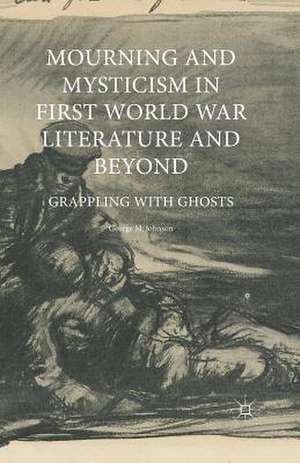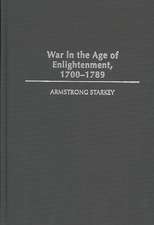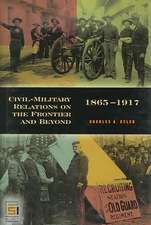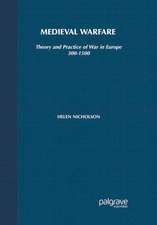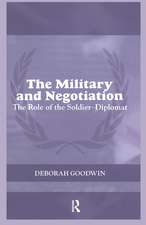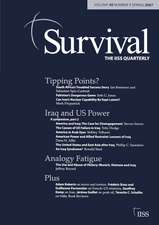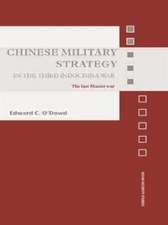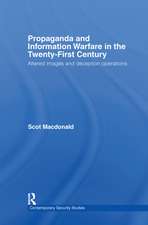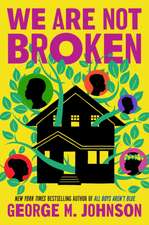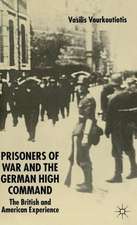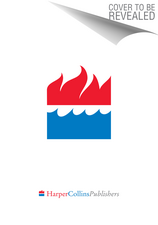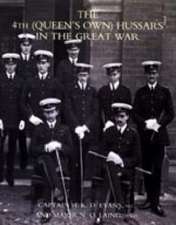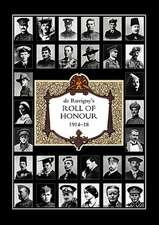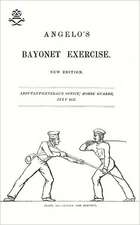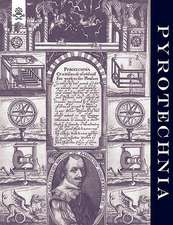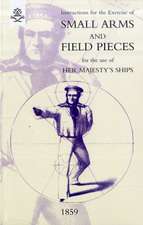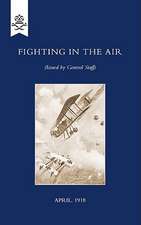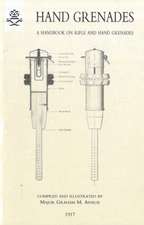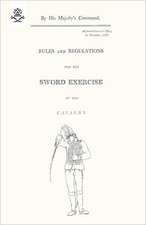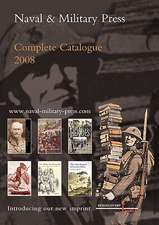Mourning and Mysticism in First World War Literature and Beyond: Grappling with Ghosts
Autor George M. Johnsonen Limba Engleză Paperback – 19 dec 2018
Preț: 212.66 lei
Nou
Puncte Express: 319
Preț estimativ în valută:
40.69€ • 43.51$ • 33.93£
40.69€ • 43.51$ • 33.93£
Carte tipărită la comandă
Livrare economică 17 aprilie-01 mai
Preluare comenzi: 021 569.72.76
Specificații
ISBN-13: 9781349673476
ISBN-10: 1349673471
Pagini: 256
Ilustrații: XIV, 256 p.
Dimensiuni: 148 x 210 x 18 mm
Greutate: 0.32 kg
Ediția:1st ed. 2015
Editura: Palgrave Macmillan UK
Colecția Palgrave Macmillan
Locul publicării:London, United Kingdom
ISBN-10: 1349673471
Pagini: 256
Ilustrații: XIV, 256 p.
Dimensiuni: 148 x 210 x 18 mm
Greutate: 0.32 kg
Ediția:1st ed. 2015
Editura: Palgrave Macmillan UK
Colecția Palgrave Macmillan
Locul publicării:London, United Kingdom
Cuprins
Preface Introduction: Attachment, Mourning and Mysticism 1. F. W. H. Myers: Loss and the Obsessive Study of Survival 2. Spirit Soldiers: Oliver Lodge's Raymond and Christopher 3. From Parodist to Proselytizer: Arthur Conan Doyle's 'Vital Message' 4. Well-Remembered Voices: Mourning and Spirit Communication in Barrie and Kipling's First World War Narratives 5. 'Mourning, the War, and the 'New Mysticism' in May Sinclair and Virginia Woolf' 6. 'Purgatorial Passions': 'The ghost' (a.k.a. Wilfred Owen) in Owen's poetry 7. ''Misty-schism': the Psychological Roots of Aldous Huxley's Mystical Modernism' 8. After-life/After-word: the Culture of Mourning and Mysticism Bibliography Index
Recenzii
"Johnson uses attachment theory and object relations theory sensitively to explore the ways in which early responses to separation and loss influence writers' visions of art. The use of contemporary psychoanalytic theory is particularly valuable when exploring the literary and cultural implications of bereavement following World War One. To my knowledge, Johnson's book may well be the first to take this approach . Johnson writes clearly and gracefully..." Jeffrey Berman, Professor of English, University at Albany, SUNY, USA
"In Mourning and Mysticism in First World War Literature and Beyond, George M. Johnson brings the literature of trauma and loss vividly to life. Johnson deftly reveals the illuminating ways in which a host of British writers drew upon their fascination with mysticism and spiritualism in order to fuel a literary corpus for the ages." Kenneth Womack, Senior Associate Dean for Academic Affairs, Penn State Altoona, USA
"By resisting commonly held assumptions, Johnson demonstrates the value that mysticism held for literature and life in a post-World War I England experiencing a state of national mourning. In doing so, Johnson makes a revelatory contribution to our understanding of Edwardian and modernist literature." Andrew J. Kunka, Professor of English, University of South Carolina Sumter, USA
"In Mourning and Mysticism in First World War Literature and Beyond, George M. Johnson brings the literature of trauma and loss vividly to life. Johnson deftly reveals the illuminating ways in which a host of British writers drew upon their fascination with mysticism and spiritualism in order to fuel a literary corpus for the ages." Kenneth Womack, Senior Associate Dean for Academic Affairs, Penn State Altoona, USA
"By resisting commonly held assumptions, Johnson demonstrates the value that mysticism held for literature and life in a post-World War I England experiencing a state of national mourning. In doing so, Johnson makes a revelatory contribution to our understanding of Edwardian and modernist literature." Andrew J. Kunka, Professor of English, University of South Carolina Sumter, USA
Notă biografică
George M. Johnson is Professor and Chair of the English Department at Thompson Rivers University in Kamloops, British Columbia, Canada. His publications include Dynamic Psychology in Modernist British Fiction, J.D. Beresford, and an award-winning comic play, Still Life With Nudes. His screenplay The Wonder was a finalist in the British Independent Film Festival.
Caracteristici
Investigates the benefits of employing psychobiography, drawing on the insights of object relations and attachment theory, to show how writers experienced this process and how it enhanced their creativity
